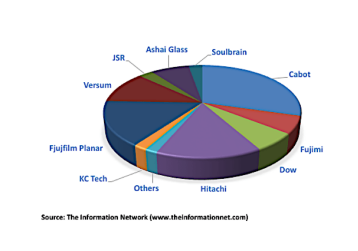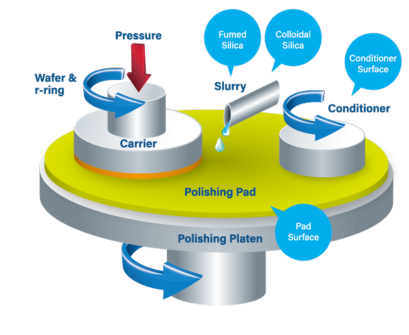CMP装置と消耗品:市場分析と予測CMP Equipment and Consumables: Market Analysis and Forecasts 原動力 装置とスラリーの両分野を含むCMP(化学的機械的平坦化)市場は現在、半導体業界の高まる需要に牽引され、ダイナミックな成長と革新の時期を迎えている。ナノメートルプロセスの微細化やチップ当た... もっと見る
サマリー原動力
装置とスラリーの両分野を含むCMP(化学的機械的平坦化)市場は現在、半導体業界の高まる需要に牽引され、ダイナミックな成長と革新の時期を迎えている。ナノメートルプロセスの微細化やチップ当たりの機能集積の推進に伴い、半導体デバイスの複雑さが増し続ける中、製造プロセスにおけるCMPの役割はかつてないほど重要になっています。この精密な材料除去プロセスは、リソグラフィーとエッチングの連続工程間でウェーハ表面の平坦性を確保するために不可欠です。

CMP装置市場では、平坦化プロセスの効率、精度、一貫性を向上させることを目的とした大幅な技術進歩が見られます。メーカー各社は、ウェーハの大型化に対応し、材料除去速度をより細かく制御できる装置の開発に注力しています。これには、パッドコンディショニング技術、ヘッドおよびキャリア技術の強化、過研磨を防止するためのより高度な終点検出システムの統合などが含まれる。自動化とソフトウェア統合の重視も顕著であり、CMP装置は、人為的ミスを最小限に抑え、リアルタイムで変化するプロセス条件に適応するための高度な監視・調整機能を備えるようになってきている。
同時に、CMPスラリー市場も装置の進化と連動して進化しており、先端半導体デバイスに見られる新素材や複雑な構造の厳しい要求に応えている。スラリーの配合は、銅、タングステン、誘電体材料など、特定の材料除去のニーズに合わせて、より多様で特殊なものになってきています。

スラリーの開発には、研磨剤の粒子径、濃度、化学添加物の微妙なバランスが必要で、欠陥の発生を最小限に抑えながら、望ましい除去率と表面仕上げを達成する必要があります。環境への配慮も最重要課題となっており、廃棄物を減らし、作業員にとってより安全な、環境に優しいスラリー組成物の開発が推し進められている。
市場成長の原動力となっているのは、民生用電子機器、高性能コンピューティング・プラットフォーム、データ・ストレージ・ソリューションに対する需要の急増であり、これらはすべて高度な半導体チップを必要とする。また、自動車分野では、電気自動車や運転支援システム向けの電子部品への依存度が高まっており、CMP市場の拡大に寄与している。5G技術やモノのインターネット(IoT)の台頭は半導体需要をさらに高め、より効率的で高性能なCMPプロセスの必要性を間接的に後押ししている。
しかし、CMP市場は、装置や材料の高コスト、半導体の進化に対応するための継続的な技術革新の必要性、複雑なサプライチェーンの管理などの課題に直面している。また、半導体産業のグローバルな性質は、CMP市場を地政学的緊張や貿易紛争にさらし、材料調達、製造、販売に影響を及ぼす可能性がある。
結論として、CMP装置とスラリー市場は、チャンスと課題が同居する重要な岐路にある。半導体産業が技術の限界に挑み続ける中、先端デバイスの製造におけるCMPの重要性は高まる一方です。市場の急速な技術変化への適応能力と、装置と消耗品の両面における技術革新能力は、半導体製造プロセスにおける将来の需要に応えるための重要な要素となるでしょう。
動向
スマートフォン、コンピューター、データセンターなどの電子機器に対する世界的な需要は、自動車産業の電子化および自律走行車へのシフトと相まって、より高度な半導体、ひいてはCMP技術の進歩に対するニーズを引き続き牽引している。5Gネットワークの展開とモノのインターネット(IoT)エコシステムの拡大は、この需要をさらに刺激し、次世代のエレクトロニクス革新を可能にするCMPの重要な役割を浮き彫りにしている。
半導体メーカーがプロセスノードの微細化(7nm、5nm、さらにその先)を推進する中、CMP装置とスラリーには、より高精度で均一な材料除去が求められている。装置は、終点検出や制御メカニズムの改善を含め、これらの微細形状がもたらす課題に対処できるよう設計されています。
主な傾向のひとつは、先端半導体製造の高精度要件を満たすために、CMP装置の技術革新を推進していることである。これには、CMPプロセス中に加えられる機械的力と化学的力の微妙なバランスを正確に管理できる、より高度な制御システムの開発が含まれる。装置は、より大きなウェーハサイズに対応し、フィーチャーサイズの縮小に伴いウェーハの平坦性を確保するために重要な材料除去速度をより細かく制御できるように設計されています。パッドコンディショニング、ウェーハキャリア設計、終点検出技術の革新は、これらの進歩に不可欠であり、欠陥を最小限に抑えながら、より高いスループットと歩留まりを可能にします。
同時に、CMPスラリー市場は、カスタマイズと特殊化の傾向を目の当たりにしている。半導体層には銅、タングステン、各種誘電体などさまざまな材料が使用されるため、スラリーの配合は特定の層材料に合わせて調整されるようになってきている。この特殊化には、研磨剤の粒子径、濃度、化学添加剤を最適化し、特定の用途で効率と効果を最大化することが含まれます。現在、スラリー製品の開発は、性能だけでなく欠陥の低減や環境負荷の低減を重視する半導体メーカーの進化するニーズとより密接に連携している。
世界各地、特にアジア太平洋地域などでの半導体製造施設の拡大が、CMP装置とスラリーの需要を促進している。半導体企業が新しい工場に投資し、既存の施設を拡張するのに伴い、大量生産をサポートし、プロセスの信頼性を確保するための高度なCMPソリューションが必要とされています。
業界の統合とコラボレーション:大手企業が戦略的買収や提携を通じて市場での地位を強化しようとするため、CMP市場は統合が進んでいます。この傾向は、装置メーカー、スラリーサプライヤー、半導体メーカー間の協業を促進し、半導体製造の進化する課題に対応する統合ソリューションの開発を促している。
CMP装置メーカーやスラリーメーカーは、3Dパッケージング、炭化ケイ素(SiC)や窒化ガリウム(GaN)デバイス、量子コンピューティングなどの新技術をサポートするため、研究開発に多額の投資を行っています。これらの技術には独自のCMP要件があり、革新的なソリューションが必要とされています。
本レポートについて
本レポートは、CMP装置およびスラリー市場の現在の市場規模と成長軌道の概要を225ページにわたって解説しています。過去のデータ、予測、市場拡大・縮小の要因も含まれています。
半導体技術の進歩、材料の多様性、環境の持続可能性、自動化、世界的な市場拡大など、CMP装置およびスラリー市場を形成する最新動向についても論じています。
CMP装置およびスラリー市場で事業を展開する主要プレイヤーを分析し、市場シェア、主要製品、競争戦略とともに予測します。スラリー市場は、スラリータイプおよびスラリーサプライヤー別に分析されている
酸化物スラリー
・ ILDスラリー
・ STIスラリー
Wスラリー
銅スラリー
・ Cuバリアスラリー
・ Cuスラリー ステップ1
本レポートは、生産コストの上昇、技術的障壁、地政学的緊張、競争圧力など、CMP装置およびスラリー市場が直面する主な課題を明らかにしている。CMP装置とスラリー市場の将来展望については、予測される成長機会、新興技術、潜在的破壊要因、利害関係者への戦略的提言などの洞察を提供しています。
目次第一章 序論1-1
第2章 エグゼクティブサマリー 2-1
第3章 平坦化手法 3-1
第4章 CMP消耗品 4-1
第5章 CMP装置 5-1
第6章 ユーザー課題 6-1
第7章 市場予測 7-1 図表リスト表の一覧
3.1 論理デバイスの相互接続レベル 3-3
3.2 代表的なプロセス仕様 3-12
3.3 IMD用途の有機ポリマー 3-23
3.4 CMPプロセス変数 3-31
3.5 最適化されたCMPおよびポストCMPクリーンパラメータ 3-39
3.6 セグメント別相互接続材料 3-48
4.1 CMPスラリーサプライヤー 4-19
4.2 研磨剤サプライヤーおよび製品 4-35
4.2 酸化物CMPパッドの特性と性能 4-44
6.1 ポリッシャー装置の目標 6-8
6.2 ポストCMPクリーン装置のターゲット 6-9
7.1 CMPポリッシャーの世界市場予測 7-7
7.2 CMPポリッシャーの世界市場シェア 7-10
7.3 CMPスラリーの世界市場予測 7-12
7.4 スラリーの世界市場シェア 7-14
7.5 CMPパッドの世界市場予測 7-22
図一覧
1.1 CMPのプロセス統合 1-2
3.1 動的ラムの統合レベル 3-2
3.2 各種方法の平坦化長さ 3-18
3.3 正規化除去率 3-29
3.4 銅による複雑性の低減 3-45
3.5 CMPからの銅損 3-50
3.6 CMP銅プロセス技術 3-52
3.7 CMP性能の改善 3-54
3.8 ポーランド終点制御 3-78
4.1 銅除去率に対する硝酸イオンの影響 4-8
4.2 Taの除去率 4-9
4.3 バルク薬液供給システム 4-15
4.4 ブラシを通した薬液供給 4-37
4.5 メガソニックスのポストCMP洗浄 4-39
4.6 3Mスラリーレスパッドの顕微鏡写真 4-50
6.1 工具のMTBFがCMPコストに与える影響 6-5
6.2 スループットとCMPコストに対する除去率 6-6
7.1 世界のCMP研磨剤市場 7-8
7.2 世界のCMPスラリー市場予測 7-13
7.3 アプリケーション別CMPスラリー市場 7-15
7.4 ILDスラリーの市場シェア 7-16
7.5 STIスラリーの市場シェア 7-17
7.6 銅バリアスラリーの市場シェア 7-18
7.7 銅ステップ1スラリーの市場シェア 7-19
7.8 世界のCMPパッドの市場予測 7-23
7.9 CMPパッドの市場シェア 7-24
SummaryDriving Forces
The Chemical Mechanical Planarization (CMP) market, encompassing both the equipment and slurry sectors, is currently experiencing a dynamic period of growth and innovation, driven by the escalating demands of the semiconductor industry. As the complexity of semiconductor devices continues to increase, with the push towards smaller nanometer processes and the integration of more functions per chip, the role of CMP in the manufacturing process has become more critical than ever. This precision material removal process is essential for ensuring the planarity of wafer surfaces between successive lithography and etching steps, a requirement that becomes increasingly challenging as device geometries shrink.

The CMP equipment market is witnessing significant technological advancements aimed at improving the efficiency, accuracy, and consistency of the planarization process. Manufacturers are focusing on developing equipment that can accommodate the increasing size of wafers and the need for finer control over material removal rates. This includes enhancements in pad conditioning techniques, head and carrier technologies, and the integration of more sophisticated endpoint detection systems to prevent over-polishing. The emphasis on automation and software integration is also prominent, with CMP equipment increasingly featuring advanced monitoring and adjustment capabilities to minimize human error and adapt to varying process conditions in real time.
Simultaneously, the CMP slurry market is evolving in tandem with equipment advancements to meet the stringent requirements of new materials and complex structures found in advanced semiconductor devices. Slurry formulations are becoming more diverse and specialized,tailored to specific material removal needs, such as copper, tungsten, or dielectric materials.

The development of slurry involves a delicate balance between abrasive particle size,concentration, and chemical additives to achieve the desired removal rate and surface finish,while minimizing defectivity. Environmental considerations are also coming to the forefront,with a push towards developing more eco-friendly slurry compositions that reduce waste and are safer for workers.
Market growth is being fueled by the burgeoning demand for consumer electronics, highperformance computing platforms, and data storage solutions, all of which require advanced semiconductor chips. Additionally, the automotive sector's increasing reliance on electronic components for electric vehicles and driver assistance systems is contributing to the expansion of the CMP market. The rise of 5G technology and the Internet of Things (IoT) further compounds the demand for semiconductors, indirectly driving the need for more efficient and capable CMP processes.
However, the CMP market faces challenges, including the high cost of equipment and materials,the need for continual innovation to keep pace with semiconductor evolution, and the management of supply chain complexities. The global nature of the semiconductor industry also exposes the CMP market to geopolitical tensions and trade disputes, which can impact material sourcing, manufacturing, and sales.
In conclusion, the CMP equipment and slurry market is at a critical juncture, with opportunities and challenges in equal measure. As the semiconductor industry continues to push the boundaries of technology, the importance of CMP in manufacturing advanced devices will only grow. The market's ability to adapt to rapid technological changes, along with its capacity to innovate in both equipment and consumables, will be key factors in meeting the future demands of the semiconductor manufacturing process.
Trends
The global demand for electronic devices, including smartphones, computers, and data centers,coupled with the automotive industry's shift towards electronic and autonomous vehicles,continues to drive the need for more advanced semiconductors and, by extension, for advancements in CMP technology. The rollout of 5G networks and the expansion of the Internet of Things (IoT) ecosystem further fuel this demand, highlighting the critical role of CMP in enabling the next generation of electronic innovations.
As semiconductor manufacturers push towards smaller process nodes (such as 7nm, 5nm, and beyond), CMP equipment and slurries are required to provide higher precision and uniformity in material removal. Equipment is being designed to handle the challenges posed by these smaller geometries, including improved endpoint detection and control mechanisms.
One of the primary trends is the push towards technological innovation in CMP equipment to meet the precision requirements of advanced semiconductor manufacturing. This includes the development of more sophisticated control systems that can accurately manage the delicate balance of mechanical and chemical forces applied during the CMP process. Equipment is being designed to accommodate larger wafer sizes and achieve finer control over material removal rates, critical for ensuring the planarity of wafers as feature sizes shrink. Innovations in pad conditioning, wafer carrier designs, and endpoint detection technologies are integral to these advancements, enabling higher throughput and yield while minimizing defects.
Concurrently, the CMP slurry market is witnessing a trend towards customization and specialization. As different materials—such as copper, tungsten, and various dielectrics—are used in semiconductor layers, slurry formulations have become increasingly tailored to specific layer materials. This specialization involves optimizing the abrasive particle size, concentration, and chemical additives to maximize efficiency and effectiveness for particular applications. The development of slurry products is now more closely aligned with the evolving needs of semiconductor manufacturers, emphasizing not only performance but also the reduction of defectivity and environmental impact.
The expansion of semiconductor manufacturing facilities worldwide, particularly in regions like Asia-Pacific, is fueling the demand for CMP equipment and slurries. As semiconductor companies invest in new fabs and expand existing facilities, there's a corresponding need for advanced CMP solutions to support high-volume production and ensure process reliability.
Industry Consolidation and Collaboration: The CMP market is experiencing consolidation as major players seek to strengthen their market position through strategic acquisitions and partnerships. This trend is driving collaboration between equipment manufacturers, slurry suppliers, and semiconductor companies to develop integrated solutions that address the evolving challenges of semiconductor manufacturing.
CMP equipment and slurry manufacturers are heavily investing in research and development to support emerging technologies such as 3D packaging, silicon carbide (SiC) and gallium nitride (GaN) devices, and quantum computing. These technologies have unique CMP requirements that necessitate innovative solutions.
About This Report
This 225-page report provides an overview of the current market size and growth trajectory for CMP equipment and slurry markets. Include historical data, forecasts, and factors driving market expansion or contraction.
It discusses the latest trends shaping the CMP equipment and slurry markets, such as advancements in semiconductor technology, materials diversity, environmental sustainability,automation, and global market expansion.
Key Players operating in the CMP equipment and slurry markets and analyzed and forecast,along with their market share, key product offerings, and competitive strategies. Slurry markets are analyzed by slurry type and slurry supplier
Oxide slurry
• ILD Slurry
• STI Slurry,
W Slurry
Copper slurry
• Cu Barrier Slurry
• Cu Slurry Step 1
This report identifies key challenges facing the CMP equipment and slurry markets, such as rising production costs, technological barriers, geopolitical tensions, and competitive pressures.It provides insights into the future outlook for CMP equipment and slurry markets, including anticipated growth opportunities, emerging technologies, potential disruptors, and strategic recommendations for stakeholders.
Table of ContentsChapter 1 Introduction1-1Chapter 2Executive Summary 2-1
2.1 Introduction 2-1
2.2 Market Opportunities 2-9
Chapter 3Planarization Methods 3-1
3.1 Need for Planarity 3-1
3.1.1 Lithography 3-4
3.1.2 Deposition 3-6
3.1.3 Etching 3-10
3.2 Applications 3-13
3.2.1 Dielectrics 3-13
3.2.2 Metals 3-15
3.3 Planarization Techniques 3-17
3.3.1 Local Planarization 3-17
3.3.1.1Deposition-Etchback 3-17
3.3.1.2ECR 3-19
3.3.1.3Oxide Reflow 3-19
3.3.1.4Spin-on-Glass 3-20
3.3.1.5TEOS-Ozone 3-20
3.3.1.6Laser 3-21
3.3.2 Global Planarization 3-22
3.3.2.1Spin-On Polymer 3-22
3.3.2.2Polyimide Coating 3-24
3.3.2.3Isotropic Etch 3-24
3.3.2.4Spin Etch Planarization 3-25
3.3.2.5Electropolishing 3-26
3.4 CMP 3-28
3.4.1 Background 3-33
3.4.2 Research Efforts 3-34
3.4.3 Advantages and Disadvantages 3-35
3.4.4 Process Parameters 3-37
3.4.4.1STI Planarization 3-39
3.4.4.2Copper CMP 3-43
3.4.4.3Low-K Integration 3-57
3.4.4.4Defect Density 3-65
3.4.4.5Metrology 3-67
3.4.5 Device Processing Parameters 3-80
3.4.5.1Memory Devices 3-80
3.4.5.2Logic Devices 3-81
Chapter 4CMP Consumables 4-1
4.1 Slurries 4-1
4.1.1 Types 4-1
4.1.2 pH Effects 4-7
4.1.3 Oxidizers 4-10
4.1.4 Particle Morphology Effects 4-11
4.1.5 Chemical Distribution Management 4-13
4.1.6 Slurry Supplier Profiles 4-18
4.1.7 Abrasive Suppliers 4-32
4.2 Post-CMP Clean 4-36
4.3 Polishing Pads 4-42
4.3.1 Types 4-42
4.3.2 Performance 4-43
4.3.3 Slurryless Pads 4-49
Chapter 5CMP Equipment 5-1
5.1 Single-Head Approach 5-1
5.1.1 Advantages 5-1
5.1.2 Disadvantages 5-3
5.2 Multi-Head Approach 5-4
5.2.1 Advantages 5-4
5.2.2 Disadvantages 5-5
5.3 Equipment Profiles 5-6
5.3.1 Applied Materials 5-7
5.3.2 Ebara 5-8
5.3.3 Strasbaugh 5-9
5.3.4 Novellus 5-9
5.3.5 Nikon 5-10
5.3.6 Doosan Mecatec 5-11
5.3.7 Other Entrants 5-11
5.4 Clustered Tools 5-12
5.5 Competitive Non-CMP Tools 5-15
Chapter 6 User Issues 6-1
6.1 Cost of Ownership 6-1
6.2 User Requirements 6-7
6.3 Benchmarking a Vendor 6-10
6.3.1 Pricing 6-10
6.3.2 Vendor Commitment and Attitudes 6-12
6.3.3 Vendor Capabilities 6-13
6.3.4 System Capabilities 6-15
6.4 User-Supplier Synergy 6-16
6.4.1 Feedback During Equipment Evaluation 6-16
6.4.2 Feedback During Device Production 6-17
6.5 Reliability 6-18
6.6 Equipment Maintainability 6-19
Chapter 7Market Forecast 7-1
7.1 Introduction 7-1
7.2 Market Forecast Assumptions 7-4
7.3 Equipment Market 7-5
7.3.1 Introduction 7-5
7.3.2 CMP Polisher Market 7-6
7.4 Consumable Market 7-11
7.4.1 Slurry 7-11
7.4.2 Pads 7-21
List of Tables/GraphsList of Tables
3.1 Interconnect Levels of Logic Device 3-3
3.2 Typical Process Specifications 3-12
3.3 Organic Polymers for IMD Applications 3-23
3.4 CMP Process Variables 3-31
3.5 Optimized CMP and Post-CMP Clean Parameters 3-39
3.6 Interconnect Materials by Segment 3-48
4.1 CMP Slurry Suppliers 4-19
4.2 Abrasive Suppliers and Products 4-35
4.2 Oxide CMP Pad Properties and Performance 4-44
6.1 Polisher Equipment Targets 6-8
6.2 Post-CMP Clean Equipment Targets 6-9
7.1 Worldwide CMP Polisher Market Forecast 7-7
7.2 Worldwide CMP Polisher Market Shares 7-10
7.3 Worldwide CMP Slurry Market Forecast 7-12
7.4 Worldwide Slurry Market Shares 7-14
7.5 Worldwide CMP Pad Market Forecast 7-22
List of Figures
1.1 Process Integration for CMP 1-2
3.1 Levels of Integration of Dynamic Rams 3-2
3.2 Planarization Lengths of Various Methods 3-18
3.3 Normalized Removal Rates 3-29
3.4 Reduced Complexity With Copper 3-45
3.5 Copper Loss From CMP 3-50
3.6 CMP Copper Process Technologies 3-52
3.7 CMP Performance Improvements 3-54
3.8 Polish Endpoint Control 3-78
4.1 Effect of Nitrate Ions on the Cu Removal Rate 4-8
4.2 Removal Rate of Ta 4-9
4.3 Bulk Chemical Distribution System 4-15
4.4 Through The Brush Chemical Delivery 4-37
4.5 Megasonics Post-CMP Clean 4-39
4.6Micrograph Of 3M Slurryless Pad 4-50
6.1 Effect of Tool MTBF on CMP Cost 6-5
6.2 Removal Rate Vs Throughput and CMP Cost 6-6
7.1 Worldwide CMP Polisher Market 7-8
7.2 Worldwide CMP Slurry Market Forecast 7-13
7.3 CMP Slurry Market by Application 7-15
7.4 ILD Slurry Market Share 7-16
7.5 STI Slurry Market Share 7-17
7.6 Copper Barrier Slurry Market Share 7-18
7.7 Copper Step 1 Slurry Market Share 7-19
7.8 Worldwide CMP Pad Market Forecast 7-23
7.9 CMP PAD Market Shares 7-24
ご注文は、お電話またはWEBから承ります。お見積もりの作成もお気軽にご相談ください。本レポートと同分野(半導体製造装置)の最新刊レポートThe Information Network社の 半導体プロセスレポートシリーズ分野 での最新刊レポートよくあるご質問The Information Network社はどのような調査会社ですか?インフォメーションネットワーク (The Information Network) は、半導体製造に関連する材料や半導体のエンドアプリケーションなどの市場を幅広く調査・分析する米国ペンシルベニア州の調... もっと見る 調査レポートの納品までの日数はどの程度ですか?在庫のあるものは速納となりますが、平均的には 3-4日と見て下さい。
注文の手続きはどのようになっていますか?1)お客様からの御問い合わせをいただきます。
お支払方法の方法はどのようになっていますか?納品と同時にデータリソース社よりお客様へ請求書(必要に応じて納品書も)を発送いたします。
データリソース社はどのような会社ですか?当社は、世界各国の主要調査会社・レポート出版社と提携し、世界各国の市場調査レポートや技術動向レポートなどを日本国内の企業・公官庁及び教育研究機関に提供しております。
|
|






